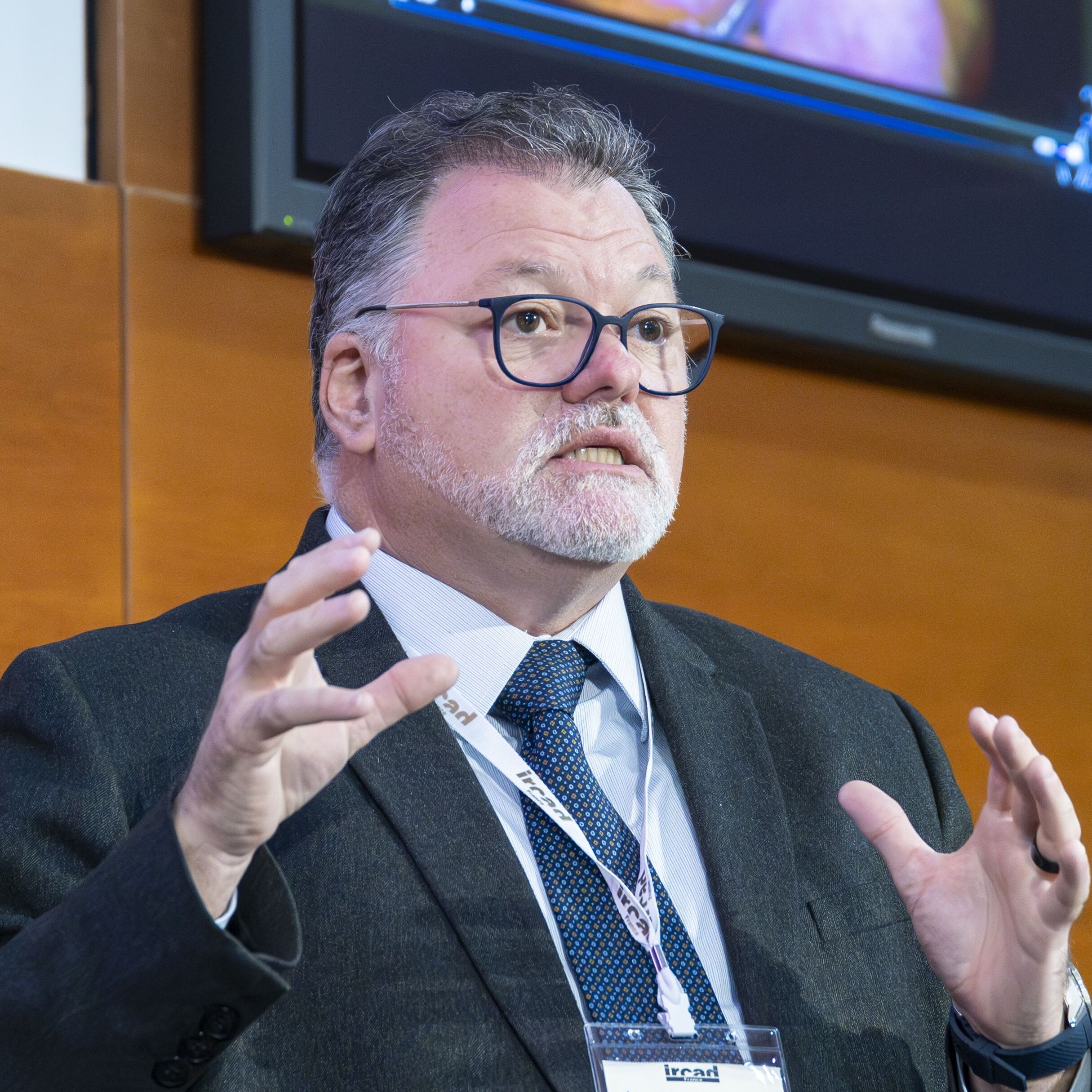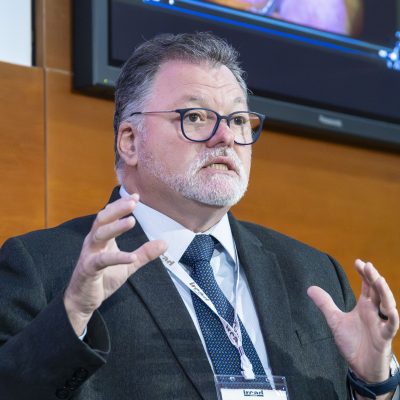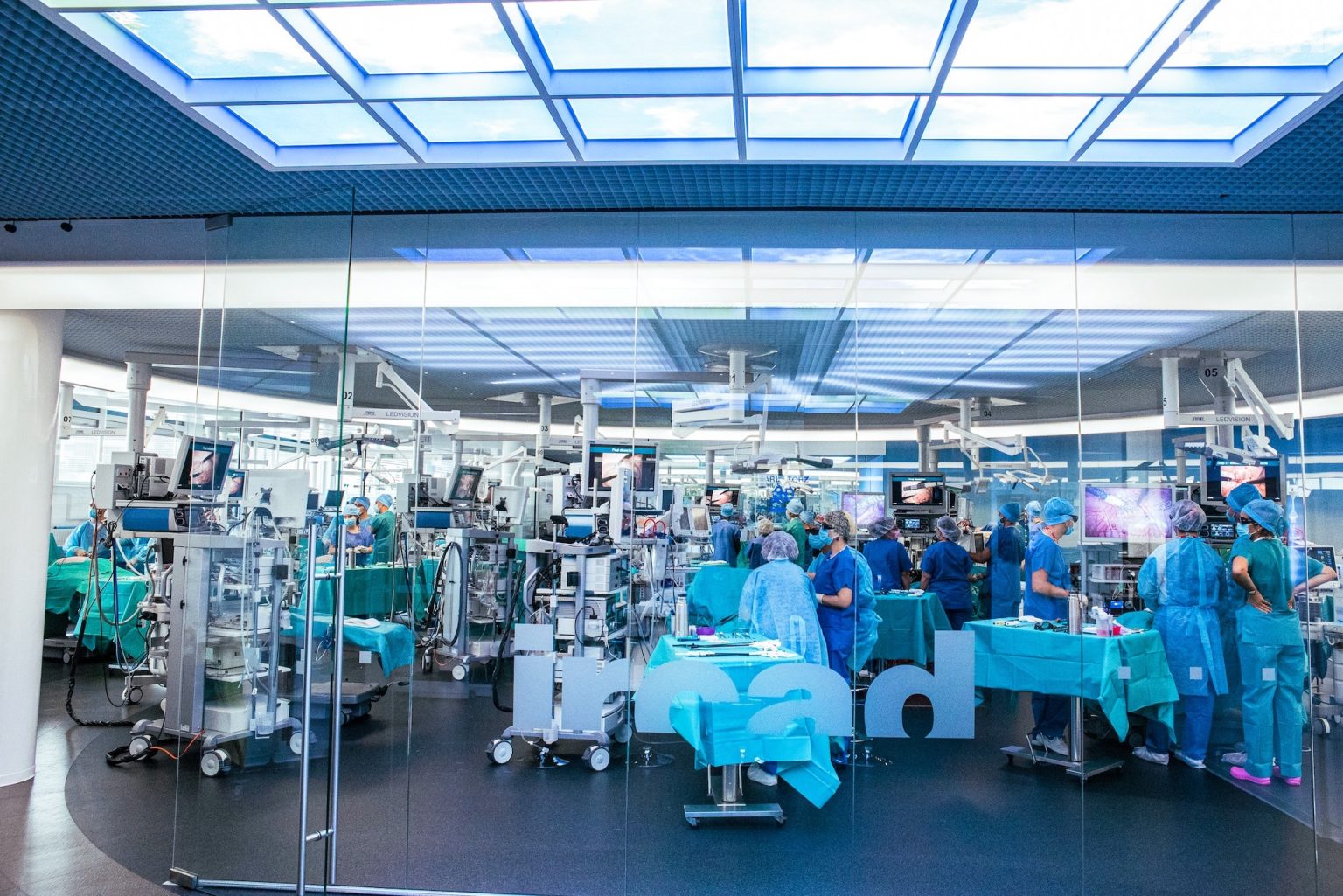
From July 16 to 20, Strasbourg will have the honor of hosting the Annual Congress of the Society of Robotic Surgery (SRS), with hands-on sessions and telesurgery held at IRCAD, and plenary sessions at the Palais des Congrès. Covering a wide range of topics related to robotic surgery, the SRS serves as an international forum dedicated to continuously advancing the clinical potential of robotic technologies. A truly global event, the SRS Congress brings together the world’s leading experts in robotic surgery to explore the most innovative technologies, including robotic platforms, augmented reality, and artificial intelligence.
This 2025 edition will place special emphasis on recent advances in “remote surgery” (or “telesurgery”), with a strong historical significance: the first remote surgical procedure was performed on September 7, 2001, by my team and me from New York, on a patient hospitalized in Strasbourg — an operation known as the “Lindbergh Operation.” The Congress will highlight the benefits telesurgery offers today, especially in promoting equitable access to care in areas lacking sufficient numbers of health professionals trained in complex surgical procedures. Can we imagine that, even in 2025, 4.9 billion people still do not have safe access to the surgical care they need? For instance, fewer than 5% of patients experiencing a stroke who are eligible for neuroradiological treatment currently receive this delicate intervention.
It is therefore imperative to support the expansion of telesurgery, as it represents a true therapeutic revolution for patients who currently lack access to appropriate surgical care.
The Congress will also provide an opportunity to review the latest developments in robotic surgery, whether in terms of new indications, such as breast cancer treatment, or technological breakthroughs, such as the emergence of autonomous surgical robots.
An internationally recognized expert in colorectal surgery, Dr. Armando MELANI has been closely linked to IRCAD’s history for over twenty years. Scientific Director of IRCAD America Latina and a member of the SRS Strategic Committee, he shares his insights on this upcoming edition of the Congress, particularly regarding the global evolution of telesurgery.

Professor Jacques Marescaux
President & Founder of IRCAD

Dr Armando Melani : France has a long-standing tradition of surgical excellence, which has extended to minimally invasive surgery and flexible endoscopy. The University of Strasbourg is highly regarded for its scientific research, with several Nobel Prizes awarded to its scholars. However, I believe the decisive factor in choosing Strasbourg is the presence of IRCAD, due to Professor Marescaux’s significant role in the history of surgery—particularly the development of telesurgery—and the global importance of the Institute, which continues, more than 30 years after its creation, to train a growing number of participants from around the world.
IRCAD is recognized as the global benchmark for training in laparoscopic and robotic surgery, and its robotic platform is the most extensive in the world. The Strasbourg Institute alone houses nearly forty robots, which is truly impressive. It’s a fantastic opportunity for us, as surgeons, to gather in one place to exchange perspectives and discover the newest surgical systems. The beauty of this congress lies in our ability to come together from all corners of the world—whether from South America like myself, or from Europe, the U.S., or Africa. One of IRCAD’s greatest strengths is its ability to unite people and facilitate exchanges on what’s best for patients, both through this kind of global event and through the mirror institutes established worldwide. Hosting this congress at IRCAD is a tremendous opportunity for the SRS to continue its development.
Dr. AM: I believe we’ll have many discussions around our practices and how to improve the sharing of our experiences.
Another even more crucial topic—and one that explains why the Congress is being held in Strasbourg—is telesurgery. At last year’s SRS Congress, we addressed the topic of telesurgery from a global standpoint for the first time. The issue is that telesurgery is not regulated internationally, and no one really knows how to do it. Each country has its own legislation and rules. This year, we decided to organize a discussion focused specifically on this global dimension, because telesurgery is not just an issue for France, the U.S., or Brazil—it’s a truly global concern. Several healthcare regulatory agencies from around the world will be present. The U.S. was already involved in last year’s discussion, with representatives from the White House and the FDA, and they’re returning this year. Agencies from Europe, Japan, Asia, and even Brazil will also be present. This is very important, because we need to regulate not only the procedure itself but also the training involved.
Telesurgery can make a real difference for patients in areas where it’s difficult to find well-trained specialists. For example, globally, over 70% of stroke patients are not treated in time. Even within countries like the U.S., some regions lack stroke specialists. In such cases, telesurgery is a true therapeutic option and brings equity to healthcare access.
We hope this year’s discussion will lay the foundation for a global agreement to regulate telesurgery and make it viable across borders, because more and more countries are implementing strict, but different, rules. For instance, I used to go to France to perform live surgeries. Now, French regulations have changed and, as a foreign surgeon—even though I’m internationally recognized—I am no longer allowed to do that. In contrast, U.S. regulations are evolving to allow high-profile foreign surgeons to practice, as the country faces a shortage of surgeons; fewer and fewer Americans are choosing surgical careers.
We must reach an agreement so that the rules are the same worldwide and so that telesurgery can truly be practiced globally. I think this is the most important point of the Congress.
Many developments are underway that will benefit both practitioners and patients.
When Professor Marescaux decided to create an IRCAD in Africa, in Rwanda, we witnessed firsthand a very different reality in terms of access to healthcare, compared to Europe or even Brazil. To be clear, I’m not saying African professionals lack competence; the issue lies in access. For example, pregnancy follow-up is inadequate, which is why the “Disrumpere” research project was launched jointly by IRCAD France and IRCAD Africa. It aims to improve access to ultrasound by training non-specialist practitioners with the help of artificial intelligence. This initiative is even more promising because ultrasound can be used in situations beyond pregnancy. Imagine that instead of requiring a human operator, a robotic arm could perform the scan, thereby broadening access and allowing images to be shared with experts—or analyzed directly by an AI system. This would be very useful for procedures like mammography, potentially offering greater diagnostic accuracy than humans. This would open diagnostic access in regions lacking trained professionals.
Another area of development is autonomous robotics to assist surgeons. For example, performing laparoscopic gallbladder surgery typically requires two surgeons. But in isolated regions—or even in the U.S.—one surgeon may perform the procedure with help from a non-surgeon assistant. That’s why research is underway into autonomous movements like suturing. Of course, we can suture by hand, but robotic precision could be superior. In the future, certain steps in surgery could be performed by autonomous robots.
One of our greatest achievements has been standardizing our procedures. We welcome experts from around the world to teach at IRCAD America Latina, and it’s much easier to align with them when we have clear teaching objectives and standardized approaches. In the years following our opening, we trained many people from Brazil and across South America (about 40% of our participants), thanks to our outreach at congresses and meetings across the continent. We’ve been able to observe the videos and presentations from that time, and after all these years, we’ve seen significant improvements in countries whose professionals trained with us. For example, in Peru, which is deeply committed to our training system, we can see a clear improvement by comparing their early videos to what they’re doing today. Seeing such progress in skills makes us extremely proud of our role in promoting equitable access to care through education.
To achieve this, we work constantly with IRCAD France, our “flagship.” Together, we’re developing several projects, particularly in robotic surgery, which is still being introduced in South America. Given the cost of these technologies, we aim to understand and teach the most efficient ways to use them given the resources available in Latin America, so that patients can benefit as much as possible.
Another achievement is the creation, a few years ago, of a hub fostering the emergence of companies developing solutions and platforms to improve healthcare access. These companies can join this hub to discuss not only surgical matters but also broader healthcare issues, such as how to best leverage new technologies and artificial intelligence, and how to generate new ideas for improving care delivery. For instance, one company is developing a WhatsApp-based system to assess patients’ condition after discharge on days 1, 2, and 3—because in Brazil, we need hospital beds and have to discharge patients as early as possible.
This hub is all the more valuable because we work closely with the other IRCADs, sharing ideas and experiences to continuously improve our practices. Since needs differ across South America, Europe, and Asia, it’s fascinating to understand these differences and collaboratively develop solutions that fit the needs of each institute. This collaboration is further strengthened by the recent creation of the IRCAD International Foundation, which connects all institutes through a structured framework with regular meetings, allowing us to discuss challenges, similarities, and opportunities to improve or create new training programs.
This strong interaction among institutes is essential to developing the best services and improving care worldwide. It perfectly reflects IRCAD’s philosophy of generosity: the generosity of experts who come to teach and share their experience, the generosity of participants who come to learn and enhance their skills, and the generosity of IRCAD’s staff who show passion and dedication in their daily work.
Founded in 1994 by Professor Jacques Marescaux, IRCAD is an institute dedicated to training and research in minimally invasive surgery. The Strasbourg institute is internationally renowned for the excellence of its training programs—whether on-site, with nearly 8,800 surgeons trained in Strasbourg each year, or online through the free WebSurg university, which has more than 470,000 registered members worldwide.
For more information, visit: https://www.ircad.fr/fen/
We hope you enjoyed this 19th edition of the IRCAD newsletter.
For any request for information, subscription, or unsubscription:
FINN Partners – sante@finnpartners.com

Please note that the IRCAD administrative board and staff are closely monitoring the evolving COVID-19 situation, in full compliance with all applicable laws and regulations in France. The health, safety, and well-being of our participants, experts and staff are our top priority!
Despite the current context, the IRCAD stands firmly by your side to help you acquire knowledge and skills. Come and join us !
We would like to draw your attention that the « Vaccine Pass » is now mandatory in France since end of January 2022 and replaces the former « Health Pass » to access places that are open to the public, such as cinemas, museums, cafés and restaurants, hotels as well as the IRCAD Institute which welcomes participants in the framework of its courses and seminars. Thus, a PCR test without vaccination is no longer sufficient to take part in our courses.
The vaccine pass includes a proof of the following (one of the 3 items is sufficient):
Further information about the new vaccine pass can be found at :
We very much hope to be able to count on your kind understanding of those rules which have been set by the French Government and which our Institute is required to apply